#zadonsk
Video
Zadonsk 11 by Alexxx Malev
Via Flickr:
Russia. Zadonsk. Monastery. Ascension Cathedral
Задонск. Задонский Богородице-Тихоновский Тюнинский женский монастырь. Вознесенский собор
#2016#ascension cathedral#cathedral#january#lipetsk oblast#monastery#russia#winter#zadonsk#вознесенский собор#задонск#задонский богородице-тихоновский тюнинский женский монастырь#зима#липецкая область#монастырь#россия#собор#январь#flickr#russian tumblr#русский tumblr
38 notes
·
View notes
Text
When the sinner, motivated by God's grace begins to repent, he meets with various temptations. A man begins to approach Christ, and satan follows after him to trouble him and lure him away from Christ, to trip him up and spread out various nets.
Saint Tikhon of Zadonsk
148 notes
·
View notes
Text
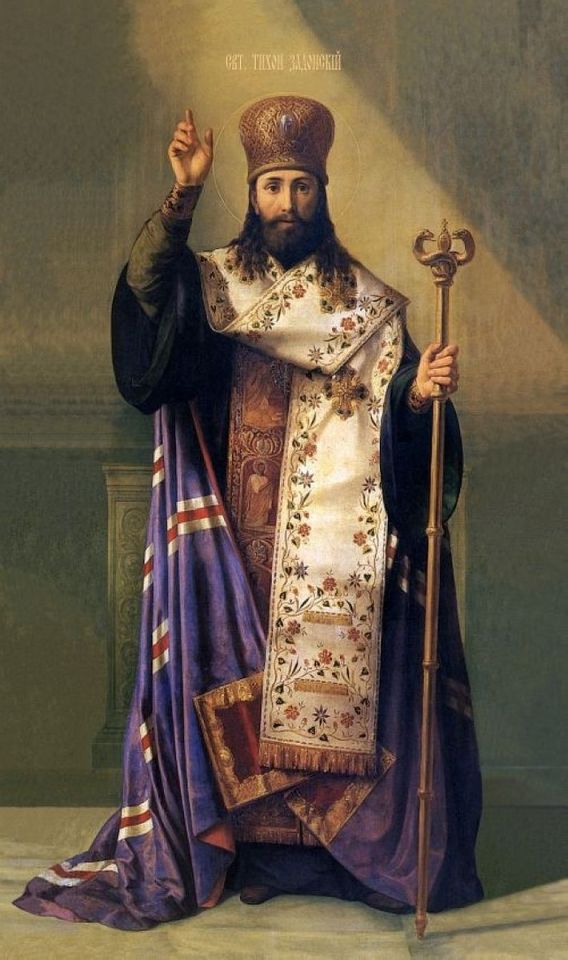
"We were created for eternal life by our Creator, we are called to it by the word of God, and we are renewed by holy Baptism. And Christ the Son of God came into the world for this, that He should call us and take us there, and He is the one thing needful. For this reason your very first endeavor and care should be to receive it. Without it everything is as nothing, though you have the whole world under you."
~St. Tikhon of Zadonsk
(Image via orthochristian.com)
#Orthodox Christian#saints#Tikhon of Zadonsk#created for eternal life#Lord Jesus Christ#Son of God#receive God's gift
77 notes
·
View notes
Text
Today in Christian History

Today is Saturday, August 13th, the 225th day of 2022. There are 140 days left in the year.
Today’s Highlight in History:
662: Death of St. Maximus the Confessor, who had been a vigorous opponent of Monothelitism. Dreadfully persecuted, he had been humiliated, had his tongue cut out and his right hand chopped off. Monothelitism was the heresy that Christ had a divine, but no human, will.
1587: Manteo becomes the first Native American baptized as a Protestant, taking the baptismal name Jack Straw. Sir Walter Raleigh will also name him Baron of Roanoke and Dasamongueponke.
1768: John Witherspoon assumes the presidency of Nassau Hall (i.e. the original Princeton).
1783: Death of Tikhon of Zadonsk, a bishop of the Russian Orthodox Church, notable for his spiritual writings that stressed love and forgiveness. “Do we forgive our neighbors their trespasses? God also forgives us in His mercy. Do we refuse to forgive? God, too, will refuse to forgive us. As we treat our neighbors, so also does God treat us.”
1843: Ganga Narayan Sil, a learned convert from Hinduism, preaches his final sermon. Although never formally ordained, he had preached in streets and in chapels, winning Hindus and Muslims to Christ.
1861: Missionary James Stewart arrives in Cape Town, South Africa. He will found the Lovedale Center.
1878: Death of Elizabeth Prentiss, a school teacher who had written the hymn “More Love to Thee, O Christ.”
1908: Death of Ira D. Sankey. He had been Dwight L. Moody’s song evangelist for three decades, and had penned many hymn tunes, including the tunes to which “Faith is the Victory” and “Simply Trusting Every Day” are sung.
2009: The Guardian reports charges by a Brazilian prosecutor that Edir Macedo and ten associate leaders in the eight-million-member Universal Kingdom of God, siphoned billions of dollars of charitable contributions on lavish personal expenses.
#Today in Christian History#August 13#Death of Elizabeth Prentiss#Death of Ira D. Sankey#Ganga Narayan Sil preaches his final sermon#Death of Tikhon of Zadonsk#Manteo becomes the first Native American baptized as a Protestant
7 notes
·
View notes
Photo



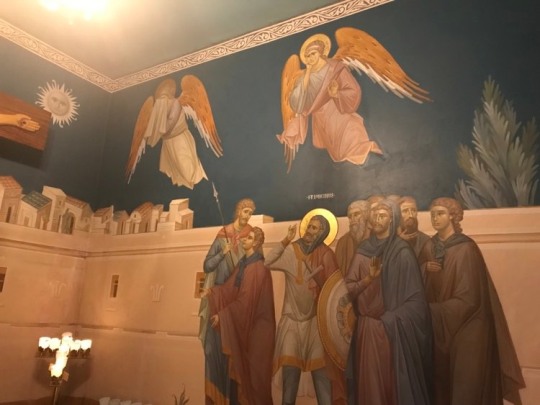




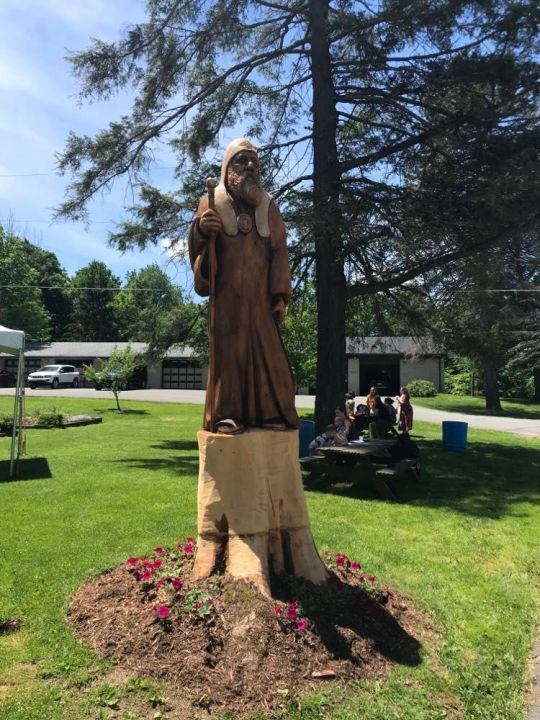
Photos from St. Tikhon's Monastery and Seminary in South Canaan, PA. (This is the oldest Orthodox Christian monastery in the United States of America.)
See more information at these links:
St. Tikhon's Monastery -> https://sttikhonsmonastery.org/
St. Tikhon's Seminary -> https://www.stots.edu/
#Orthodox Christianity#orthodoxy#Christianity#American Orthodoxy#Pennsylvania#St. Tikon of Zadonsk#St. Tikhon's Monastery#St. Tikhon's Seminary#STOTS#St. Tikhon#photographs
3 notes
·
View notes
Text

In order not to lose heart when we fall sick we are to think about and mentally "kiss the sufferings of our Savior just as though we were with Him while He suffers abuses, wounds, humiliations...shame, the pain of the nails, the piercing with the lance, the flow of water and blood. From this we will receive consolation in our sickness. Our Lord will not let these efforts go unrewarded " (St. Tikhon of Zadonsk).
24 notes
·
View notes
Text
I wish you a blessed week! A prayer for anyone in need.
“Let thy mind fast from vain thoughts; let thy memory fast from remembering evil; let thy will fast from evil desire; let thine eyes fast from bad sights: turn away thine eyes that thou mayest not see vanity; let thine ears fast from vile songs and slanderous whispers; let thy tongue fast from slander, condemnation, blasphemy, falsehood, deception, foul language and every idle and rotten word; let thy hands fast from killing and from stealing another’s goods; let thy legs fast from going to evil deeds: Turn away from evil, and do good.” - St. Tikhon of Zadonsk

12 notes
·
View notes
Text
Power of Prayer
PRAY ALWAYS …
A monk when he eats, drinks, sits, officiates, travels or does any other thing must continually cry: “Lord, Jesus Christ, Son of God, have mercy upon me!” so that the name of the Lord Jesus, descending into the depths of the heart, should subdue the serpent ruling over the inner pastures and bring life and salvation to the soul. He should always live with the name of the Lord Jesus, so that the heart absorbs the Lord and the Lord the heart, and the two become one.
- St. John Chrysostom
PRAY WITH YOUR HEART …
Do not spare yourself from heartfelt prayer even when you have spent the whole day in hard work. Do not indulge in laziness when you pray; tell God everything that is in your heart. If you allow yourself time to pray with diligence, you will not fall asleep before you have wept over your sins. Believe that, if for the sake of bodily rest you pray hurriedly, you will lose the tranquility of both body and soul. By what labor, sweat and tears is our closeness to God achieved!
- St. John of Kronstadt
PREPARE TO BE TEMPTED NOT TO PRAY …
If you strive after prayer, prepare yourself for diabolical suggestions and bear patiently their onslaughts; for they will attack you like wild beasts…. Try as much as possible to be humble and courageous. He who endures will be granted great joy.
- St. Nilus of Sinai
FORCE YOURSELF TO PRAY …
I advise you to convince yourself and force yourself to prayer even if you do not feel the desire for it. God seeing such labor and application will give you goodwill and zeal. Such good will and a certain attraction to prayer is often a result of habit. Get into this habit and it will draw you to prayer and good actions.
- St. Tikhon of Zadonsk

3 notes
·
View notes
Note
This is a different anon, but I really appreciate what you said about your prolife & pro-choice views. I've never heard that quote by Chrysostom before and it is very interesting. I have another question though: is it possible for someone to be forgiven from the sin of abortion?
Saint Tikhon of Zadonsk said “There is more mercy in God than there are sins in us.”
I believe that there is not a single sin ever conceived of that cannot be forgiven by God if the person truely repents. This is radical love; Love to the end and without exceptions. God knows us, God understands us, God will always forgive us if we ask Him; “The steadfast love of the Lord never ceases, his mercies never come to an end” (Lamentations 3:22 NRSV).
6 notes
·
View notes
Text
Saints&Reading: Friday, August, 26, 2022
2august 26_august 13
SAINT TIKHON OF ZADONSK, BISHOP OF VORONEZH (1783)
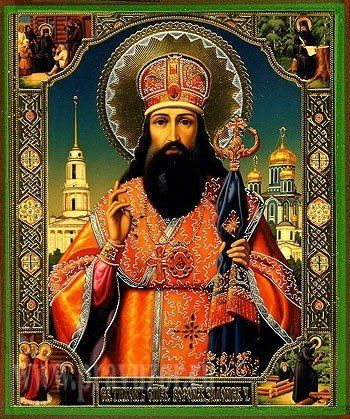
Saint Tikhon of Zadonsk, Bishop of Voronezh (in the world Timothy), was born in the year 1724 in the village of Korotsk in the Novgorod diocese, into the family of the cantor Sabellius Kirillov. (A new family name, Sokolov, was given him afterwards by the head of the Novgorod seminary). His father died when Timothy was a young child, leaving the family in such poverty that his mother was barely able to make ends meet. She wanted to give him to be raised by a neighbor, a coachman, since there was nothing with which to feed the family, but his brother Peter would not permit this. Timothy often worked a whole day with the peasants for a single piece of black bread.
As a thirteen-year-old boy, he was sent to a clergy school near the Novgorod archbishop’s home, and earned his keep by working with the vegetable gardeners. In 1740, he was accepted under a state grant set up for the Novgorod seminary. The youth excelled at his studies. Upon finishing seminary in 1754, he became a teacher there, first in Greek, and later in Rhetoric and Philosophy. In the year 1758, he was tonsured with the name Tikhon. In that same year they appointed him to be prefect of the seminary.
In 1759, they transferred him to Tver, elevating him to be archimandrite of the Zheltikov monastery. Later, they appointed him rector of the Tver seminary and, at the same time, head of the Otroch monastery.
His election as bishop was providential. Metropolitan Demetrius, the presiding member of the Holy Synod, had intended to transfer the young archimandrite to the Trinity-Sergiev Lavra. On the day of Pascha, at Peterburg, Archimandrite Tikhon was one of eight candidates being considered for selection as vicar-bishop for Novogorod. The lot fell on him three times.
On the same day, during the Cherubic Hymn, Bishop Athanasius of Tver, without realizing it, commemorated him as a bishop while cutting out particles from the prosphora at the Table of Oblation. On May 13, 1761 he was consecrated Bishop of Keksgolma and Ladoga (i.e., a vicar bishop of the Novgorod diocese).
In 1763, Saint Tikhon was transferred to the See of Voronezh. During the four and a half years that he administered the Voronezh diocese, Saint Tikhon provided constant edification, both by his life and by his numerous pastoral guidances and soul-saving books. He wrote a whole series of works for pastors:
Concerning the Seven Holy Mysteries
A Supplement to the Priestly Office
Concerning the Mystery of Repentance
An Instruction Concerning Marriage
The saint considered it essential that each priest, deacon and monk have a New Testament, and that he should read it daily. In an Encyclical, he called on pastors to perform the Holy Mysteries with reverence, with the fear of God, and love for one’s neighbor. (An Explanation of Christian Duties was often republished in Moscow and Peterburg during the eighteenth century).
At Voronezh the saint eradicated an ancient pagan custom, the celebration in honor of Yarila (a pagan god associated with the fertility of grain and cattle). In the outlying districts where military units of the Don Cossacks were dispersed, he formed a missionary commission to restore sectarians to the Orthodox Church.
In 1765, Saint Tikhon transformed the Voronezh Slavic-Latin school into a seminary. He invited experienced instructors from Kiev and Kharkhov, and planned the courses for it. He exerted much attention and effort to build up both the churches and the school, and to guide pastors to understand the need for education.
The saint was unflagging in his efforts to administer the vast diocese, and he often spent nights without sleep. In 1767, poor health compelled him to give up running the diocese and withdraw for rest to the Tolshevsk monastery, at a distance 40 versts from Voronezh.
In 1769, the saint transferred to the monastery of the Theotokos in the city of Zadonsk. Having settled into this monastery, Saint Tikhon became a great teacher of the Christian life. With deep wisdom he set forth the ideal of true monasticism in his Rule of Monastic Living and his Guidances to Turn from the Vanity of the World, and in his own life he fulfilled this ideal. He kept strictly to the precepts of the Church. Zealously (almost daily) he visited the temple of God, and he often sang and read in the choir. In time, out of humility, he altogether ceased participating and serving, but merely stood in the altar, reverently making the Sign of the Cross over himself. He loved to read the Lives of the Saints and the works of the Holy Fathers. He knew The Psalter by heart, and he usually read or sang the Psalms on his journeys.
The saint underwent much tribulation because he had to leave his flock. When he recovered his health, he thought about returning to the Novgorod diocese, where Metropolitan Gabriel had invited him to head the Ivḗron Vallaisk monastery. But when his cell-attendant mentioned this to the Elder Aaron, he declared: “Are you mad? The Mother of God does not direct him to move away from here.” The cell-attendant conveyed this to His Grace.
“If that is so,” said the saint “I shall not move away from here,” and he tore up the invitation. Sometimes he journeyed to the village of Lipovka, where he celebrated church services at the Bekhteev house. The saint journeyed also to the Tolshev monastery, which he loved for its solitude.
The fruition of all his spiritual life were the books that the saint wrote while in retirement: A SPIRITUAL TREASURY, GATHERED FROM THE WORLD (1770), and ON TRUE CHRISTIANITY (1776).
The saint lived in very simple circumstances: he slept on straw, covered by a sheepskin coat. His humility was so great that he paid no attention to the workers who laughed at him as he walked about the monastery, pretending that he did not hear it. He used to say, “It is pleasing to God that even the monastery workers mock me, and I deserve it because of my sins.” He often said, “Forgiveness is better than revenge.”
Once, a fool named Kamenev struck the saint on the cheek saying, “Don’t be so haughty.” The saint, accepting this with gratitude, gave the fool three kopeks every day for the rest of his life.
All his life the saint “in troubles, and sorrows, and insults... joyfully endured, mindful that there can be no crown without the victory, nor victory without effort, nor effort without struggle, nor struggle without enemies” (Ode 6 of the Canon).
Strict towards himself, the saint was indulgent towards others. On the Friday before Palm Sunday, he entered the cell of his friend the schemamonk Metrophanes, and he saw him at table together with Cosmas Ignatievich, of whom he was also fond. There was fish on the table, and his friends became upset (fish is not permitted during Lent, except for Feast days). The saint said, “Sit down, for I know you. Love is higher than fasting.” To further calm them, he ate some of their fish soup.
He especially loved the common folk, and comforted them in their grievous lot, interceding with the landowners, and moving them to compassion. He gave away his pension, and gifts from admirers, to the poor.
By his deeds of self-denial and love of soul, the saint advanced in contemplation of Heaven and foresaw the future. In 1778, he had a vision in his sleep: the Mother of God stood in the clouds, and near Her were the Apostles Peter and Paul. On bended knees, the saint prayed to the All-Pure Virgin for the peace of the whole world. The Apostle Paul loudly exclaimed: “When they shall say, peace and safety; then sudden destruction will come upon them” (I Thess. 5:3). The saint fell asleep in trembling and in tears. The following year, he again saw the Mother of God in the air and several people near Her. The saint knelt down, and near him four others in white garments also fell to their knees. The saint entreated the All-Pure Virgin for someone, that She would not leave him (the saint did not tell his cell-attendant who the four people were, nor for whom the request was made). She answered, “Let it be as you ask.”
Saint Tikhon prophesied much about the future, particularly the victory of Russia over the French in 1812. More than once they saw the saint in spiritual rapture, with a transformed and luminous face, but he forbade them to speak about this.
For three years before his repose he prayed each day, “Tell me, O Lord, of my end.” And a quiet voice in the morning dawn said, “It will be on a Sunday.” In that same year, he saw in a dream a beautiful meadow with wondrous palaces upon it. He wanted to go inside, but they said to him: “In three years, you may enter. For now, continue your labors.” After this the saint secluded himself in his cell and admitted only a few friends.
Both clothing and a grave were prepared for the time of his death. He often came to weep over his coffin, while standing hidden from people in a closet. A year and three months before his death, in a vivid dream, it seemed to the saint that he was standing in the monastery church. A priest of his acquaintance was carrying the Divine Infant, covered with a veil, out of the altar through the Royal Doors. The saint approached and kissed the Infant on the right cheek, and he felt himself stricken on the left. Awakening, the saint sensed a numbness in his left cheek, his left leg, and a trembling in his left hand. He accepted this illness with joy.
Shortly before his death, the saint saw in a dream a high and twisting ladder and he heard a command to climb it. “At first, I was afraid because of weakness,” he told his friend Cosmas. “But when I started to go climb, the people standing around the ladder lifted me higher and higher, up to the very clouds.”
“The ladder,” said Cosmas, “is the way to the Heavenly Kingdom. Those who helped were those you have helped by your advice, and they remember you.” The saint said with tears, “I thought so, too. I feel that my end is near.” He frequently received the Holy Mysteries during his illness.
Saint Tikhon died, as was revealed to him, on Sunday August 13, 1783, at the age of fifty-nine. The first uncovering of his relics occurred on May 14, 1846.
Saint Tikhon’s glorification took place on Sunday August 13, 1861.
Source: Orthodox Church in America
VENERABLE RADEGUNDE OF POITIER, NUN (587)

Venantius Fortunatus: Life of St. Radegund
[Venantius Fortunatus (530-609), the author of this text, served as advisor and secretary to Queen Radegund (b. 520-5; d. 587), who had fled her husband, the Frankish King Clothar I (d. 561), founded an abbey at Poitiers and become a nun. Venantius Fortunatus wrote a number of saints’ lives and religious songs and poems; he became Bishop of Poitiers c. 590.]
1. Our Redeemer is so richly and abundantly generous that He wins mighty victories through the female sex and, despite their frail physique, He confers glory and greatness on women through strength of mind. By faith, Christ makes them strong who were born weak so that, when those who appeared to be imbeciles are crowned with their merits by Him who made them, to garner praise for their Creator who hid heavenly treasure in earthen vessels. For Christ the king dwells with his riches in their bowels. Mortifying themselves in the world, despising earthly consort, purified of worldly contamination, trusting not in the transitory, dwelling not in error but seeking to live with God, they are united with the Redeemer’s glory in Paradise. One of that company is she whose earthly life we are attempting to present to the public, though in homely style, so that the glorious memory that she, who lives with Christ, has left us will be celebrated in this world. So ends the Prologue.
Here begins the life.
2. The most blessed Radegund was of the highest earthly rank, born from the seed of the kings of the barbarian nation of Thuringia. Her grandfather was King Bassin, her paternal uncle, Hermanfred and her father, King Bertechar.(1) But she surpassed her lofty origin by even loftier deeds. She had lived with her noble family only a little while when the victorious Franks devastated the region with barbaric turmoil and, like the Israelites, she departed and migrated from her homeland.(2) The royal girl became part of the plunder of these conquerors and they began to quarrel over their captive. If the contest had not ended with an agreement for her disposition, the kings would have taken up arms against one another. Falling to the lot of the illustrious King Clothar(3), she was taken to Athies in Vermandois, a royal villa, and her upbringing was entrusted to guardians.(4) The maiden was taught letters and other things suitable to her sex and she would often converse with other children there about her desire to be a martyr if the chance came in her time.(5) Thus even as an adolescent, she displayed the merits of a mature person. She obtained part of what she sought, for, though the church was flourishing in peace, she endured persecution from her own household. While but a small child, she herself brought the scraps left at table to the gathered children, washing the head of each one, seating them on little chairs and offering water for their hands, and she mingled with the infants herself.(6) She would also carry out what she had planned beforehand with Samuel, a little cleric.(7) Following his lead, carrying a wooden cross they had made, singing psalms, the children would troop into the oratory as somber as adults. Radegund herself would polish the pavement with her dress and, collecting the drifting dust around the altar in a napkin, reverently placed it outside the door rather than sweep it away. When the aforementioned king, having provided the expenses, wished to bring her to Vitry she escaped by night from Athies through Beralcha with a few companions.(8) When he settled with her that she should be made his queen at Soissons, she avoided the trappings of royalty, so she would not grow great in the world but in Him to Whom she was devoted and she remained unchanged by earthly glory.(9)
3. Therefore, though married to a terrestrial prince, she was not separated from the celestial one and, the more secular power was bestowed upon her, the more humbly she bent her will-more than befitted her royal status. Always subject to God following priestly admonitions, she was more Christ’s partner than her husband’s companion. We will only attempt to publicize a few of the many things she did during this period of her life. Fearing she would lose status with God as she advanced in worldly rank at the side of a prince, she gave herself energetically to almsgiving. Whenever she received part of the tribute, she gave away a tithe of all that came to her before accepting any for herself. She dispensed what was left to monasteries, sending the gifts to those she could not reach on foot. There was no hermit who could hide from her munificence.(10) So she paid out what she received lest the burden weigh her down. The voice of the needy was not raised in vain for she never turned a deaf ear. Often she gave clothes, believing that the limbs of Christ concealed themselves under the garments of the poor and that whatever she did not give to paupers was truly lost...continue reading University of Wisconsin-Milwaukee
Department of History


MATTHEW 24:27-33, 42-51
27 For as the lightning comes from the east and flashes to the west, so also will the coming of the Son of Man be. 28 For wherever the carcass is, there the eagles will be gathered together. 29 Immediately after the tribulation of those days the sun will be darkened, and the moon will not give its light; the stars will fall from heaven, and the powers of the heavens will be shaken. 30 Then the sign of the Son of Man will appear in heaven, and then all the tribes of the earth will mourn, and they will see the Son of Man coming on the clouds of heaven with power and great glory. 31 And He will send His angels with a great sound of a trumpet, and they will gather together His elect from the four winds, from one end of heaven to the other. 32 Now learn this parable from the fig tree: When its branch has already become tender and puts forth leaves, you know that summer is near. 33 So you also, when you see all these things, know that it is near-at the doors! 42 Watch therefore, for you do not know what hour your Lord is coming. 43 But know this, that if the master of the house had known what hour the thief would come, he would have watched and not allowed his house to be broken into. 44 Therefore you also be ready, for the Son of Man is coming at an hour you do not expect. 45 Who then is a faithful and wise servant, whom his master made ruler over his household, to give them food in due season? 46 Blessed is that servant whom his master, when he comes, will find so doing. 47 Assuredly, I say to you that he will make him ruler over all his goods. 48 But if that evil servant says in his heart, 'My master is delaying his coming,' 49 and begins to beat his fellow servants, and to eat and drink with the drunkards, 50 the master of that servant will come on a day when he is not looking for him and at an hour that he is not aware of, 51 and will cut him in two and appoint him his portion with the hypocrites. There shall be weeping and gnashing of teeth.2
Commentaries from the church Fathers
John Chrysostom AD 407 For this intent He tells them not, in order that they may watch, that they may be always ready; therefore He says, When ye look not for it, then He will come, desiring that they should be anxiously waiting, and continually in virtuous action. But His meaning is like this: if the common sort of men knew when they were to die, they would surely strive earnestly at that hour.
Hilary of Poitiers AD 368 To teach us that our ignorance of the date of his return (which his silence has kept hidden from everyone) is not without its usefulness, Christ warns us to keep all his commandments. We should also be occupied with constant prayer in order to guard against the coming of the thief. For the thief is the devil who seeks to invade our bodily homes with the darts of his thoughts and allurements in order to ruin us while we are sleepy and careless. It is good therefore that we be prepared. Our ignorance of the day of Christ’s return should provoke us to be careful as we eagerly await his coming.
2 CORINTHIANS 4:13-18
13And since we have the same spirit of faith, according to what is written, "I believed and therefore I spoke," we als believe and therefore speak,14 knowing that He who raised up the Lord Jesus will also raise us up with Jesus, and will present us with you.15 For all things are for your sakes, that grace, having spread through the many, may cause thanksgiving to abound to the glory of God.16Therefore we do not lose heart. Even though our outward man is perishing, yet the inward man is being renewed day by day.17For our light affliction, which is but for a moment, is working for us a far more exceeding and eternal weight of glory,18 while we do not look at the things which are seen, but at the things which are not seen. For the things which are seen are temporary, but the things which are not seen are eternal.
Commentaries of the Church Fathers
Caesarius of ArlesAD 542: If you seek temporal things, you pray publicly and with your door open. If you ask for eternal things, your prayer is secret because you long to receive not the things which are seen but those which are not seen.
Clement Of Alexandria AD 215: But us the Word enjoins "to look not on the things that are seen, but the things that are not seen; for the things that are seen are temporal, but the things that are not seen are eternal.". With such persecution, if you have worldly wealth, if you have brothers allied by blood and other pledges, abandon the whole wealth of these which leads to evil; procure peace for yourself, free yourself from protracted persecutions; turn from them to the Gospel; choose before all the Saviour and Advocate and Paraclete of your soul, the Prince of life. "For the things which are seen are temporary; but the things which are not seen are eternal."
#orthodoxy#orthodoxchristianity#easternchristianity#originofchristianity#spirituality#holyscriptures#gospel#gospel wisdom
4 notes
·
View notes
Video
Zadonsk 10 by Alexxx Malev
Via Flickr:
Russia. Zadonsk. Monastery of the Nativity of the Virgin Mary, gate
Задонск. Задонский Рождество-Богородицкий монастырь, ворота
#2016#gate#january#lipetsk oblast#monastery#monastery of the nativity of the virgin mary#russia#winter#zadonsk#ворота#задонск#задонский рождество-богородицкий монастырь#зима#липецкая область#монастырь#россия#январь#flickr#russian tumblr#русский tumblr
23 notes
·
View notes
Text
Whenever you read the Gospel, Christ Himself is speaking to you. And while you read, you are praying and talking to Him.
Saint Tikhon of Zadonsk
140 notes
·
View notes
Text
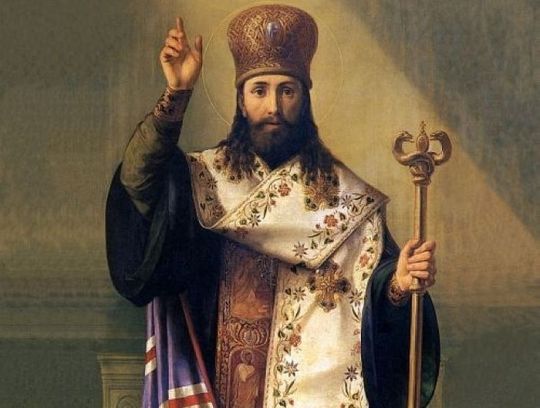
"It is a fearful thing to hate whom God has loved. To look upon another—his weaknesses, his sins, his faults, his defects—is to look upon one who is suffering. He is suffering from negative passions, from the same sinful human corruption from which you yourself suffer. This is very important: do not look upon him with the judgmental eyes of comparison, noting the sins you assume you’d never commit. Rather, see him as a fellow sufferer, a fellow human being who is in need of the very healing of which you are in need. Help him, love him, pray for him, do unto him as you would have him do unto you."
~St. Tikhon of Zadonsk
(Image via orthochristian.com)
#Christian art#Orthodox Christian#saints#St. Tikhon of Zadonsk#pray for fellow sufferers#love one another#Do unto others as you would have them do unto you#Golden Rule
61 notes
·
View notes
Text
Sfântul Tihon din Zadonsk: Cine vrea să se mântuiască, acela trebuie să-şi dezlipească inima de cele lumeşti https://c.aparatorul.md/8cmsm
0 notes
Text
Купить гидротестер на Авито в Задонск
https://www.avito.ru/zadonsk?q=%D0%B3%D0%B8%D0%B4%D1%80%D0%BE%D1%82%D0%B5%D1%81%D1%82%D0%B5%D1%80
0 notes
Text

Even if we are bedridden, we are to continue the struggle against the passions, producing fruits worthy of repentance. This work of perfection demands that we acquire patience and longsuffering. What better way to do this than when we lie on a bed of infirmity? St. Tikhon of Zadonsk says that in suffering we can find out whether our faith is living or just "theoretical." The test of true faith is patience in the midst of sufferings, for "patience is the Christian's coat of arms." "What is it to follow Christ?" he asks. It is "to endure all things, looking upon Christ Who suffered. Many wish to be glorified with Christ, but few seek to remain with the suffering Christ. Yet not merely by tribulation, but even in much tribulation does one enter the Kingdom of God."
17 notes
·
View notes

